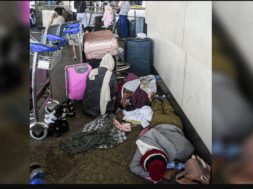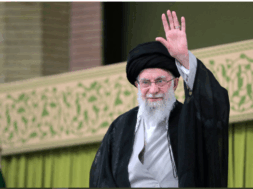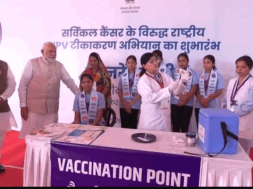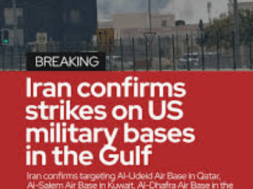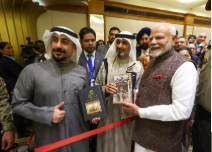
Modi in Kuwait: PM Meets Arabic Translator, Publisher of Two Indian Epics
NEW DELHI, Dec 21: The Prime Minister Narendra Modi, who arrived on a two-day visit to Kuwait, on Saturday met Abdullah Al Baroun and Abdul Lateef Al Nesef, the individuals behind the Arabic versions of India’s two iconic epics, the Ramayana and the Mahabharata.
Abdulla Al Baroun has translated both Ramayana and Mahabharata in Arabic and Abdul Lateef Al Nesef has published the Arabic versions of Ramayan And Mahabharat.
Al Nesef, the book publisher, said “I am very happy, it is an honour for me. Mr Modi is very happy with this. These books are very important. He (Prime Minister Modi) signed both the books.” He said the Prime Minister asked how many years it took for translation, to which he replied that it took him two years and eight months.
Mr Modi had earlier highlighted their work in his Mann Ki Baat radio address, underlining the importance of cultural diplomacy in strengthening international relationships. Al Nesef and Abdullah Al Baroun have translated over 30 books and epics into Arabic from across the world.
Abdullah Al Baroun, the translator of both epics, shared insights into the extensive effort that went into translating the works, a process that took over two years. The Arabic versions of the Ramayana and Mahabharata were published by Al Nesef, a prominent Kuwaiti publisher, further contributing to the cross-cultural understanding.
Mr Modi landed in Kuwait on a historic two-day visit where he will hold several key meetings, including an address to the Indian diaspora, hold talks with the top Kuwaiti leadership, visit an Indian labour camp, address the Indian community and attend the opening ceremony of the Gulf Cup football tournament. This is the first visit by an Indian Prime Minister to the country in 43 years. The last Indian Prime Minister to visit Kuwait was Mrs Indira Gandhi in 1981. The trip comes at the invitation of Sheikh Meshal Al-Ahmad Al-Jaber Al-Sabah, the Amir of the State of Kuwait.
Later Mr Modi while addressing the Indian community program ‘Hala Modi,’ said India has the skill, technology, innovation and manpower that ‘New’ Kuwait needs. Mr Modi said the relationship that was built by culture and commerce was scaling new heights today.
“People from North, West, East and South, who speak different languages are here- ‘lekin sab ke dil me ek hi goonj hai – Bhatrat Mata Ki Jai’…This is a special moment for me. After 43 years, more than four decades, an Indian Prime Minister has come to Kuwait. It takes four hours to reach Kuwait from India but it took four decades for the Prime Minister,” he said.
“I have reached Kuwait just two and a half hours ago, since the time I have stepped here, I am feeling a different sense of belonging, a different warmth all around. You all have come from different states of India, but seeing all of you, it seems as if a mini Hindustan has come in front of me,” he added. The Prime Minister said India and Kuwait will become partners in prosperity.
“In the decades to come, we will become partners in our prosperity. Our goals aren’t different! The people of Kuwait are building New Kuwait. The people of Bharat are working to build India into a developed nation by 2047. Through trade and innovation, Kuwait wants to become a dynamic economy. India is focussing on innovation and strengthening its economy. Both goals support each other,” he said.
“In the past, the relationship that was built by culture and commerce is scaling new heights today. Today, Kuwait is an important energy and trade partner of India. For the Kuwaiti companies too, India is a huge investment destination. His Highness Crown Prince of Kuwait, during our meeting in New York, said, ‘When you are in need, India is your destination.’ The citizens of India and Kuwait have always helped each other in times of distress,” he said.
Mr Modi visited the Gulf Spic Labour Camp in Kuwait’s Mina Abdullah area, which has a workforce of around 1500 Indian. The Prime Minister interacted with a cross-section of Indian workers from different states of India and enquired about their well-being. According to a statement by the Ministry of External Affairs, the visit to the labour camp was symbolic of the importance attached by the Prime Minister to the welfare of Indian workers abroad.
The MEA further stated that in the last few years, the Indian government had undertaken several technology-based initiatives such as the E-Migrate portal, the MADAD portal, and the upgraded Pravasi Bharatiya Bima Yojana for the welfare of Indian workers abroad.
Mr Modi also extended an invitation to diaspora members to participate in Pravasi Bharatiya Divas and Maha Kumbh to be held in India in January 2025. Earlier, following his arrival in Kuwait, Mr Modi was greeted with a rousing welcome, as members of the Indian diaspora received him with greetings and cultural performances at the hotel.
In his departure statement, Mr Modi said his talks with top Kuwaiti leadership would be an opportunity to chalk out a roadmap for a futuristic partnership between India and Kuwait. “We deeply value the historical connection with Kuwait that has been nurtured over generations. We are not just strong trade and energy partners but also have shared interest in peace, security, stability and prosperity in the West Asia region,” he said.
PM Modi said he was looking forward to his meetings with the Emir, the Crown Prince and the Prime Minister of Kuwait. India is among the top trading partners of Kuwait. He would also meet the vibrant Indian diaspora here. The Indian community is the largest expatriate community in Kuwait.
Indians constitute 21% (1 million) of the total population of Kuwait and 30% of its work-force (approx 9 lakhs). Indian workers top the Private Sector as well as domestic sector (DSW) work force list, according to Indian Embassy in Kuwait. Kuwait is among India’s top trading partners, with bilateral trade valued at $10.47 billion in the financial year 2023-24.
Kuwait is India’s sixth largest crude supplier, meeting 3% of the country’s energy needs. Indian exports to Kuwait reached $2 billion for the first time, while investments by the Kuwait Investment Authority in India exceed $10 billion. India and Kuwait have enjoyed traditionally friendly relations, with links dating back to pre-oil Kuwait when maritime trade with India was the backbone of its economy.
(Manas Dasgupta)

